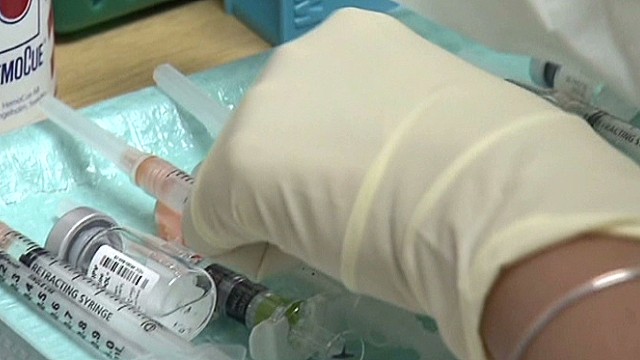Anti-Vaccine Activist Review Of Autism-Vaccine Link Sparks Outrage: NBC 5 Dallas Report

Table of Contents
The NBC 5 Dallas Report and its Impact
The NBC 5 Dallas report featured an interview with an anti-vaccine activist who voiced unsubstantiated claims connecting childhood vaccines, specifically the MMR (measles, mumps, and rubella) vaccine, to the development of autism. The report's impact extended far beyond the initial broadcast, sparking widespread debate and criticism on social media and in subsequent news coverage.
-
Summary of the activist's claims: The activist reiterated the debunked claim that vaccines cause autism, citing anecdotal evidence and ignoring the vast body of scientific research. They also promoted unproven alternative treatments for autism.
-
Specific quotes from the report: While specific quotes may vary depending on the exact broadcast, the core message consistently revolved around the unsubstantiated link between vaccines and autism. Phrases like "I firmly believe vaccines caused my child's autism" or similar statements highlighting unsubstantiated causality are likely to have been included.
-
Analysis of the report's framing: Critics argue the report's framing gave undue weight to the activist's claims, potentially misleading viewers by presenting them as a legitimate perspective alongside the scientific consensus. The lack of sufficient counter-arguments from qualified experts further exacerbated this issue.
-
Discussion of the social media response and news coverage: Following the broadcast, social media erupted with responses ranging from outrage to concern. Many criticized NBC 5 Dallas for providing a platform for misinformation, while others used the report as an opportunity to share accurate information about vaccine safety. The report also garnered attention from national media outlets, reigniting the broader conversation about vaccine hesitancy.
The Scientific Consensus on Vaccines and Autism
The scientific community overwhelmingly rejects any causal link between vaccines and autism. Decades of rigorous research involving millions of children have consistently failed to establish such a connection. This consensus is firmly supported by major health organizations globally.
-
Summary of major studies disproving the autism-vaccine link: Landmark studies, including large-scale epidemiological investigations, have repeatedly demonstrated no association between vaccines (like the MMR vaccine) and the development of autism spectrum disorder (ASD).
-
Mention of the CDC and WHO stances on vaccine safety: The Centers for Disease Control and Prevention (CDC) and the World Health Organization (WHO) both unequivocally state that vaccines are safe and highly effective in preventing numerous life-threatening diseases. They strongly recommend vaccination for children and adults.
-
Explanation of the retracted Lancet study and its impact on the misinformation campaign: The infamous 1998 Lancet study by Andrew Wakefield, which falsely linked the MMR vaccine to autism, has since been completely retracted due to fraudulent data and unethical practices. Despite its retraction, this study continues to be cited by anti-vaccine activists, highlighting the persistent challenge in combating misinformation.
-
Highlighting the importance of evidence-based medicine and peer-reviewed research: It is crucial to rely on evidence-based medicine and peer-reviewed research published in reputable scientific journals when evaluating health claims. Anecdotal evidence and unsubstantiated claims should not be considered reliable sources of medical information.
The Dangers of Anti-vaccine Misinformation
The consequences of spreading false information about vaccines are far-reaching and potentially devastating. Promoting vaccine hesitancy directly impacts public health, leading to preventable illnesses, outbreaks, and even deaths.
-
Increased rates of vaccine-preventable diseases due to hesitancy: Lower vaccination rates directly correlate with increased incidences of measles, mumps, whooping cough, and other preventable diseases. These diseases can cause serious complications, hospitalizations, and even death, particularly in vulnerable populations.
-
The potential for outbreaks and epidemics due to lower vaccination rates: When vaccination rates drop below a certain threshold (herd immunity), outbreaks become more likely and can spread rapidly through communities.
-
The emotional toll on families affected by vaccine-preventable illnesses: The suffering caused by vaccine-preventable diseases extends beyond the physical impact, creating significant emotional distress for families and caregivers.
-
The role of social media in amplifying anti-vaccine narratives: Social media platforms have become breeding grounds for misinformation, allowing anti-vaccine narratives to spread quickly and easily reach a vast audience.
Combating Anti-vaccine Sentiment and Promoting Vaccine Acceptance
Countering anti-vaccine sentiment requires a multi-pronged approach, encompassing education, responsible media coverage, and proactive public health initiatives.
-
The importance of media literacy and critical thinking skills: Individuals must be empowered to critically evaluate information sources and identify misinformation. Promoting media literacy is essential in navigating the complex information landscape.
-
The role of healthcare professionals in educating patients about vaccines: Doctors, nurses, and other healthcare providers play a vital role in educating patients about the safety and efficacy of vaccines, addressing concerns, and building trust.
-
The effectiveness of public health campaigns promoting vaccination: Clear, concise, and evidence-based public health campaigns can significantly increase vaccination rates.
-
The need for responsible reporting by news outlets: News organizations have a responsibility to present accurate and balanced information, avoiding platforms for misinformation and prioritizing the scientific consensus.
Conclusion
The NBC 5 Dallas report serves as a stark reminder of the dangers of amplifying anti-vaccine rhetoric. While aiming for diverse perspectives, the report inadvertently spread misinformation with potentially harmful consequences. The scientific consensus unequivocally refutes any link between vaccines and autism. The spread of false narratives about vaccines leads to preventable illnesses, outbreaks, and undermines public health. We must rely on credible sources like the CDC and WHO, promote media literacy, and support evidence-based public health initiatives. Let's actively combat anti-vaccine misinformation and work towards achieving high vaccination rates to protect our communities. Learn more about vaccine safety and debunk anti-vaccine myths by consulting the CDC and WHO websites. Remember, vaccines are a crucial tool in protecting public health.

Featured Posts
-
 Cybercriminals Office365 Exploit Millions In Losses Federal Charges Filed
Apr 27, 2025
Cybercriminals Office365 Exploit Millions In Losses Federal Charges Filed
Apr 27, 2025 -
 Toxic Chemical Contamination The Lasting Impact Of The Ohio Train Derailment
Apr 27, 2025
Toxic Chemical Contamination The Lasting Impact Of The Ohio Train Derailment
Apr 27, 2025 -
 La Garantia De Gol El Entrenamiento De Alberto Ardila Olivares
Apr 27, 2025
La Garantia De Gol El Entrenamiento De Alberto Ardila Olivares
Apr 27, 2025 -
 El Camino De Cerundolo A Cuartos De Final En Indian Wells Impacto De Las Ausencias De Fritz Y Gauff
Apr 27, 2025
El Camino De Cerundolo A Cuartos De Final En Indian Wells Impacto De Las Ausencias De Fritz Y Gauff
Apr 27, 2025 -
 Juliette Binoche Cannes Film Festival Jury President 2025
Apr 27, 2025
Juliette Binoche Cannes Film Festival Jury President 2025
Apr 27, 2025
Latest Posts
-
 Patrick Schwarzeneggers Unseen Ariana Grande Music Video Appearance A White Lotus Connection
Apr 27, 2025
Patrick Schwarzeneggers Unseen Ariana Grande Music Video Appearance A White Lotus Connection
Apr 27, 2025 -
 Patrick Schwarzeneggers Forgotten White Lotus Role In Ariana Grande Music Video
Apr 27, 2025
Patrick Schwarzeneggers Forgotten White Lotus Role In Ariana Grande Music Video
Apr 27, 2025 -
 Alaska Adventure Ariana Biermanns Romantic Trip
Apr 27, 2025
Alaska Adventure Ariana Biermanns Romantic Trip
Apr 27, 2025 -
 Ariana Biermanns Alaskan Trip A Couples Chill Adventure
Apr 27, 2025
Ariana Biermanns Alaskan Trip A Couples Chill Adventure
Apr 27, 2025 -
 Ariana Biermann And Boyfriend Enjoy Alaskan Escape
Apr 27, 2025
Ariana Biermann And Boyfriend Enjoy Alaskan Escape
Apr 27, 2025
